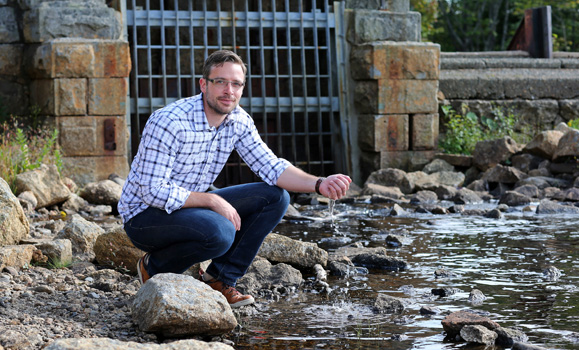Although Canada is a water-rich nation, debates over water — who has access to it and how we use it — are still part of our public discussions, with controversies and conflicts bubbling up to the surface regularly. After all, drought is a regular threat on the prairies, and First Nations across the country have been calling for better access to clean drinking water for decades.
Jeremy Schmidt, a Banting post-doctoral fellow at Dalhousie originally from dry Alberta, has immersed himself in the issues surrounding water governance in Canada.
The former forest firefighter and white-water kayaking guide had spent a lot of time with water but it really came into focus for him in India.
In 2005, he and a group of friends decided to celebrate their newly earned undergraduate degrees by backpacking through India and, being environmentally minded, they upped the ante by vowing to eschew bottled water for the duration of their trip. So they brought a filter and water purification chemicals along and spent a lot of time thinking about water.
Now having earned his PhD, Dr. Schmidt's interest in how we think about, use and make decisions about water has endured through his studies.
“I had initially planned on researching genetically modified crops but after that trip, I switched to work on water,” he explains. “My research since then has focused predominantly on the human dimensions of water management and governance.”
Disputes and disagreements
That fascination has carried him through graduate school, a first postdoctoral fellowship at Harvard and has now landed him with a prestigious Banting postdoctoral fellowship in Dalhousie’s Department of Sociology and Social Anthropology.
During his time at Dal, Dr. Schmidt plans to examine the scientific, legal and social questions over water and mining in the upstream portion of the Mackenzie River Basin. The basin covers a vast territory including parts of the Yukon, much of the Northwest Territories, large sections of Northern British Columbia and Alberta and part of Northern Saskatchewan. Disputes have been happening for years — and are still happening — over whether and, if so, how to develop natural resources in the Mackenzie.

Dr. Schmidt says technological advances in the extraction of unconventional fossil fuels in combination with federal changes to freshwater laws have made the links between science and policy even more important in the debate over water management. The upstream reaches of the Mackenzie in both Alberta and British Columbia are vital to multiple First Nations.
Federal changes to water law in 2012 mean the water policy landscape is changing in complex ways. “This project is about understanding those changes and hopefully to contribute directly to the conversation. So much of the current federal government’s focus is on opening up the North for development and the sort of development they 'need”' to do in the North in terms of unconventional fossil fuels has significant water impacts.”
Laying a groundwork
Dr. Schmidt sees his previous work as important groundwork for his current project. His doctoral project investigated the way in which Alberta had moved from a centralized provincial water management model to a watershed-by-watershed planning system, and explored the implications that has for civil society and for various river keeping groups that had been advocating for improvements in water policies.
“There has a been a shift from ‘management’ to ‘governance.’ In that shift, going from a state-led water management program to a format in which the stakeholders are brought together try to develop consensus: who controls how those procedures are set up and how the decision making is going to function becomes a critical point for the politics of water.”
For Dr. Schmidt, the attraction to Dal was the “exceptional research program that combines anthropology, law and science in the context of settler-colonial relations in Canada” being conducted by Brian Noble, an associate professor in the Department of Sociology and Social Anthropology.
Read more about Jeremy Schmidt’s work at his website.

